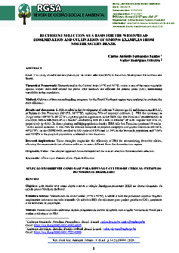Recurrent selection as a basis for the widespread dissemination and cultivation of onions: examples from Northeastern Brazil.
Recurrent selection as a basis for the widespread dissemination and cultivation of onions: examples from Northeastern Brazil.
Author(s): SANTOS, C. A. F.; OLIVEIRA, V. R.
Summary: This study aimed to review phenotypic recurrent selection (PRS) in the onion development for northeastern Brazil. Theoretical Framework: Domesticated in the Central Asia (35°N and 50°N), onion is one of the main vegetable species widely cultivated around the globe. PRS methods are efficient for genetic gains (GG), maintaining variability in the population. Method: Cultivars of two onion-breeding programs for the Brazil Northeast region were analyzed to evaluate the PRS efficiency. Results and discussion: 1. PRS resulted in the development of cultivars Valeouro Ipa 11 and Franciscana IPA 10, at Belém do São Francisco (08°45'S, 38°57'W), replacing 70% of imported cultivars. 2. PRS for resistance to Thrips tabaci (09°09’S, 40°22’W), a pest of global importance, in the 'BRS Alfa São Francisco' resulted in GG of 6%/cycle, with a bulb yield of 32.1 ton.ha-1, contrasting with 15.9 and 14.0 ton.ha-1 of 'Alfa Tropical' and 'IPA 10', respectively (p<0.01). In direct planting and high population density, BRS Alfa São Francisco produced 60 ton.ha-1 in the second semester. 3. The PRS for external brownish or purplish cataphylls and greater thickness (09°09’S, 40°22’W), in the CNPH 6400, resulted in GG/cycle of 6.83% and 11.54% in the brownish population and 7.84% and 10.92% in the purplish population, evaluated in two locations. Research implications: These examples emphasize the efficiency of PRS for accumulating favorable alleles, allowing the recommendation of onion cultivars in areas different from the domestication region. Originality/Value: The adopted approach have distinguished the massal selection from recurrent selection.
Publication year: 2024
Types of publication: Journal article
Unit: Embrapa Semi-arid Region
Keywords: Allium Cepa, Cebola, Cultivar BRS Alfa São Francisco, Cultivar BRS Carrancas, Cultivar BRS Riovale, Cultivar Franciscana IPA 10, Cultivar Valeouro IPA 11, Cultivar de cebola, Fenótipo, Melhoramento Genético Vegetal, Melhoramento genético, Praga de Planta, Seleção Recorrente, Thrips tabaci, Variedade Resistente
Observation
Some of Embrapa's publications are published as ePub files. To read them, use or download one of the following free software options to your computer or mobile device. Android: Google Play Books; IOS: iBooks; Windows and Linux: Calibre.
Access other publications
Access the Agricultural Research Database (BDPA) to consult Embrapa's full library collection and records.
Visit Embrapa Bookstore to purchase books and other publications sold by Embrapa.

